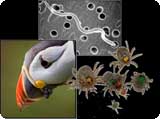séminaire du pôle évolution du vivant – vendredi 26 février 2010
 Host specialisation in ticks and their associated pathogens: adaptive divergence or transmission constraints?
Host specialisation in ticks and their associated pathogens: adaptive divergence or transmission constraints?
Karen McCoy, UMR 2724 CNRS/IRD, génétique et évolution des maladies infectieuses
vendredi 26 février 2010, à 11 heures, amphithéâtre Monge
At present, we know little about the characteristics of parasites with the potential to shift and adapt to novel hosts. This host change can have cascading effects on different interacting organisms and be particularly important for species involved in vector-borne disease. Indeed, the adaptation of vector organisms to new hosts can greatly modify the ecology and evolution of both their hosts and the micropathogens they carry. Here, I present results from two different tick systems involved in the circulation and maintenance of Lyme disease bacteria: the marine cycle involving seabird tick Ixodes uriae, and the European terrestrial cycle involving Ixodes ricinus. Both of these ticks are able to exploit a wide range of host species and transmit numerous species of the Lyme bacterial complex. Using a combination of genetic methods and field experimentation, we have examined host race formation in these ‘generalist’ ticks and investigated patterns of associated divergence in the Lyme bacteria they carry. I discuss these results in relation to the potential importance vector-based adaptations for microparasite evolution, but also for the possible importance of cascading host effects in the ecology and epidemiology of tick-borne parasites.
- extrait:
- lien_externe:
- titre:
- Host specialisation in ticks and their associated pathogens: adaptive divergence or transmission constraints?
- intervenant:
- Karen McCoy
- date:
- vendredi 26 février 2010
- kc_data:
- a:8:{i:0;s:0:"";s:4:"mode";s:0:"";s:3:"css";s:0:"";s:9:"max_width";s:0:"";s:7:"classes";s:0:"";s:9:"thumbnail";s:0:"";s:9:"collapsed";s:0:"";s:9:"optimized";s:0:"";}
- kc_raw_content:
 Host specialisation in ticks and their associated pathogens: adaptive divergence or transmission constraints?
Host specialisation in ticks and their associated pathogens: adaptive divergence or transmission constraints?Karen McCoy, UMR 2724 CNRS/IRD, génétique et évolution des maladies infectieuses
vendredi 26 février 2010, à 11 heures, amphithéâtre Monge
At present, we know little about the characteristics of parasites with the potential to shift and adapt to novel hosts. This host change can have cascading effects on different interacting organisms and be particularly important for species involved in vector-borne disease. Indeed, the adaptation of vector organisms to new hosts can greatly modify the ecology and evolution of both their hosts and the micropathogens they carry. Here, I present results from two different tick systems involved in the circulation and maintenance of Lyme disease bacteria: the marine cycle involving seabird tick Ixodes uriae, and the European terrestrial cycle involving Ixodes ricinus. Both of these ticks are able to exploit a wide range of host species and transmit numerous species of the Lyme bacterial complex. Using a combination of genetic methods and field experimentation, we have examined host race formation in these ‘generalist’ ticks and investigated patterns of associated divergence in the Lyme bacteria they carry. I discuss these results in relation to the potential importance vector-based adaptations for microparasite evolution, but also for the possible importance of cascading host effects in the ecology and epidemiology of tick-borne parasites.
